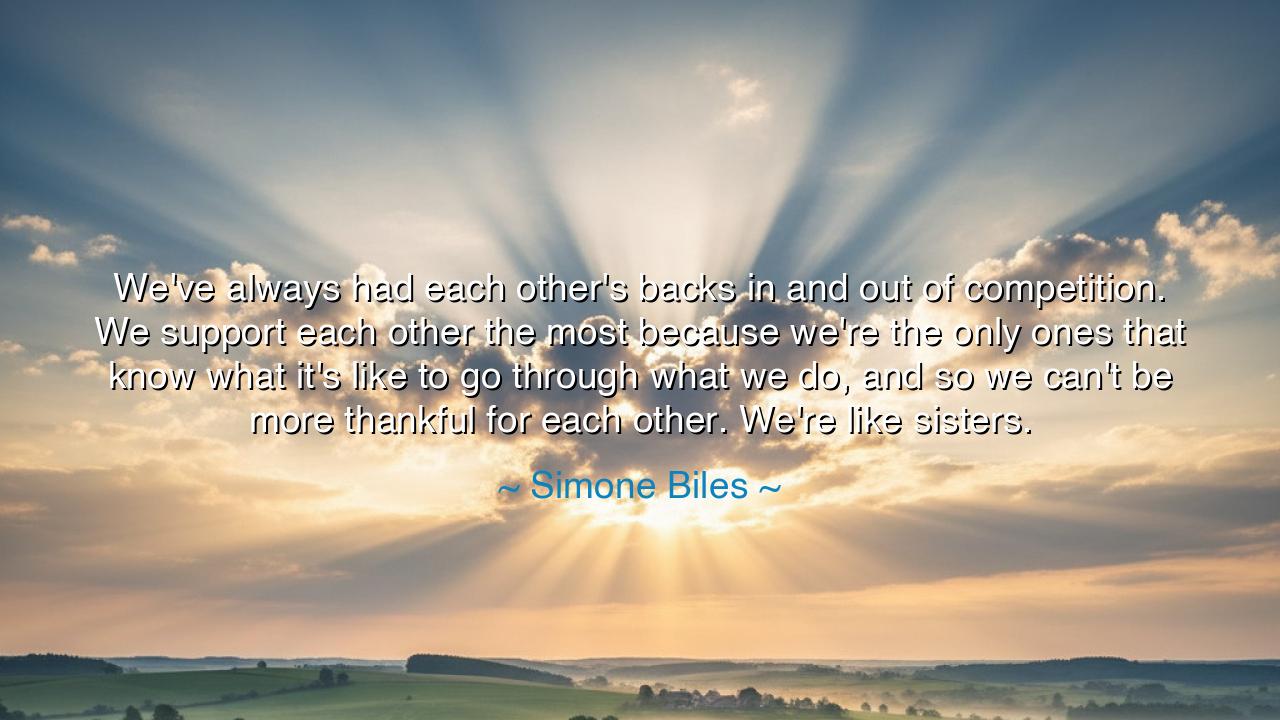
We've always had each other's backs in and out of competition.
We've always had each other's backs in and out of competition. We support each other the most because we're the only ones that know what it's like to go through what we do, and so we can't be more thankful for each other. We're like sisters.






In the words of Simone Biles, the greatest gymnast of her age, there flows not only the spirit of competition but the deeper current of sisterhood, of loyalty, and of the eternal bond that warriors, athletes, and companions of struggle have always shared. She declares, “We've always had each other's backs in and out of competition. We support each other the most because we're the only ones that know what it's like to go through what we do, and so we can't be more thankful for each other. We're like sisters.” In these words is the wisdom of ages: that no soul endures hardship alone when joined by those who understand its weight. The quote speaks not merely of teammates, but of companions in life’s fiercest battles, who carry one another when the world grows too heavy to bear.
From the dawn of history, the ancients praised the virtue of standing together. The Spartans, shoulder to shoulder in the phalanx, did not boast of their weapons or armor but of the shield, for it protected not the bearer, but the brother to his side. So too do Biles and her companions protect one another — not only in the public spectacle of competition but in the unseen struggles, the doubts, the tears, and the weariness that come when lights are extinguished and crowds grow silent. To have “each other’s backs” is to live the creed of the phalanx: to endure not as isolated individuals, but as a band of hearts bound by trust.
This truth is made visible in the story of Jesse Owens and Luz Long during the 1936 Olympics in Berlin. Owens, the African American athlete, stood before a hostile crowd under the gaze of tyranny. Long, a German long jumper, was his rival. Yet when Owens struggled with his qualifying jumps, it was Long who approached him, offered counsel, and encouraged him. Owens went on to win gold, and the two embraced before the world. Rivals they were, yet brothers they became, for they alone knew the burden of competition and the cost of striving for greatness under the eyes of the world. Such is the eternal echo of Simone’s words — only those who walk the path can know the depth of the other’s journey.
And yet, in her voice there is also the tenderness of gratitude: “We can’t be more thankful for each other.” Gratitude is the crown upon the bond of sisterhood. For many compete, many strive, and many fall, but those who have companions to lift them, to weep with them, to rejoice with them — these are the blessed. This gratitude is not born of victory, but of shared struggle. It is the bond of those who know the lonely hours of discipline, the fear of failure, and the relentless demand of excellence. Only such souls, forged together in the same fire, can truly call one another sisters.
The quote carries also the power of protection — for to be like sisters is to stand as guardians. When one falters, the other strengthens. When the world speaks doubt, the other whispers courage. This is the ancient law of friendship, more sacred than gold or glory. In Rome, Cicero proclaimed that friendship is “a complete harmony of views, of interests, and of desires.” And in every age, such harmony has been the refuge of those who endure. Simone’s words are not of fleeting companionship but of everlasting solidarity, a covenant of hearts.
What then shall we, who hear these words, learn from them? That in our own lives we must seek, cultivate, and guard such bonds. No man nor woman is meant to walk the path alone. In work, in struggle, in sorrow, in triumph — we must find those with whom we can share both our victories and our wounds. Let us therefore ask ourselves: who are the ones who truly know what it is like to bear what we bear? Who are those who stand not only in our sunlight, but also in our shadows? These are our sisters, our brothers, our companions of the spirit.
The lesson is clear: cherish them. Speak gratitude while the day is young. Defend them when the storm rises. Lift them when their steps falter. For in so doing, we weave bonds that no hardship can break. The ancients knew this, the heroes lived this, and Simone Biles reminds us of it anew. Let each reader then resolve to be that companion for another — to be the shield at their side, the voice of encouragement in their trial, the presence of comfort in their silence.
And so I say to you, O listener, as if across the ages: do not strive for greatness alone, for the path is long and perilous. Walk it with those who understand, who share the burden, who guard your back as you guard theirs. In this is strength. In this is victory. In this is the true crown of life.






AAdministratorAdministrator
Welcome, honored guests. Please leave a comment, we will respond soon